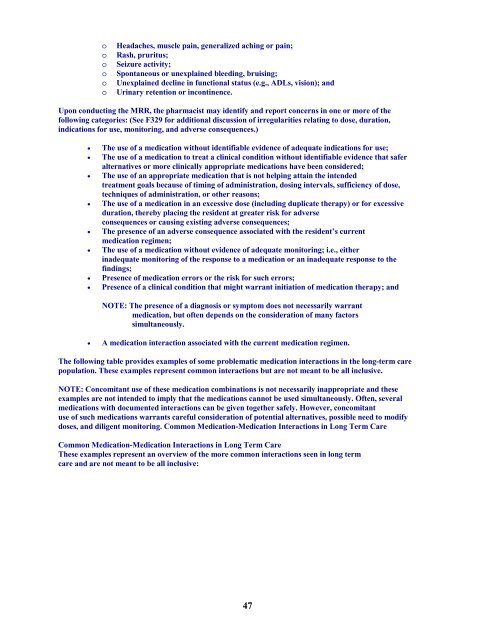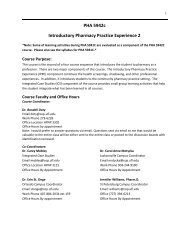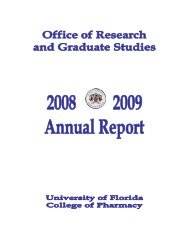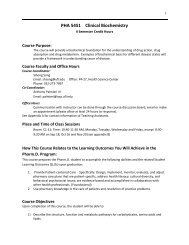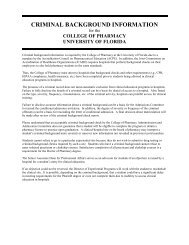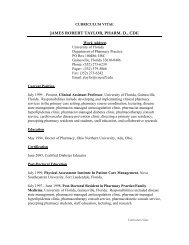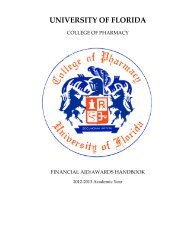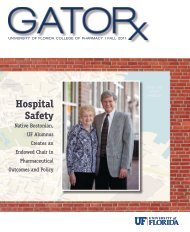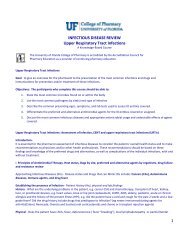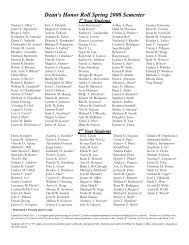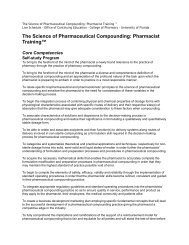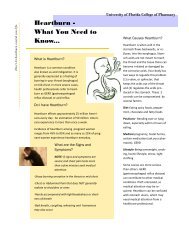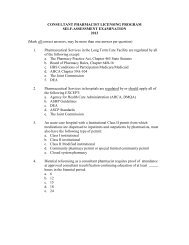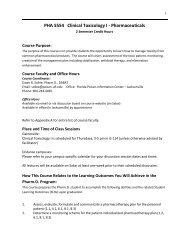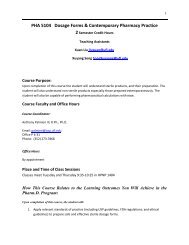Module 3: The Drug Regimen Review - College of Pharmacy ...
Module 3: The Drug Regimen Review - College of Pharmacy ...
Module 3: The Drug Regimen Review - College of Pharmacy ...
You also want an ePaper? Increase the reach of your titles
YUMPU automatically turns print PDFs into web optimized ePapers that Google loves.
o Headaches, muscle pain, generalized aching or pain;<br />
o Rash, pruritus;<br />
o Seizure activity;<br />
o Spontaneous or unexplained bleeding, bruising;<br />
o Unexplained decline in functional status (e.g., ADLs, vision); and<br />
o Urinary retention or incontinence.<br />
Upon conducting the MRR, the pharmacist may identify and report concerns in one or more <strong>of</strong> the<br />
following categories: (See F329 for additional discussion <strong>of</strong> irregularities relating to dose, duration,<br />
indications for use, monitoring, and adverse consequences.)<br />
• <strong>The</strong> use <strong>of</strong> a medication without identifiable evidence <strong>of</strong> adequate indications for use;<br />
• <strong>The</strong> use <strong>of</strong> a medication to treat a clinical condition without identifiable evidence that safer<br />
alternatives or more clinically appropriate medications have been considered;<br />
• <strong>The</strong> use <strong>of</strong> an appropriate medication that is not helping attain the intended<br />
treatment goals because <strong>of</strong> timing <strong>of</strong> administration, dosing intervals, sufficiency <strong>of</strong> dose,<br />
techniques <strong>of</strong> administration, or other reasons;<br />
• <strong>The</strong> use <strong>of</strong> a medication in an excessive dose (including duplicate therapy) or for excessive<br />
duration, thereby placing the resident at greater risk for adverse<br />
consequences or causing existing adverse consequences;<br />
• <strong>The</strong> presence <strong>of</strong> an adverse consequence associated with the resident’s current<br />
medication regimen;<br />
• <strong>The</strong> use <strong>of</strong> a medication without evidence <strong>of</strong> adequate monitoring; i.e., either<br />
inadequate monitoring <strong>of</strong> the response to a medication or an inadequate response to the<br />
findings;<br />
• Presence <strong>of</strong> medication errors or the risk for such errors;<br />
• Presence <strong>of</strong> a clinical condition that might warrant initiation <strong>of</strong> medication therapy; and<br />
NOTE: <strong>The</strong> presence <strong>of</strong> a diagnosis or symptom does not necessarily warrant<br />
medication, but <strong>of</strong>ten depends on the consideration <strong>of</strong> many factors<br />
simultaneously.<br />
• A medication interaction associated with the current medication regimen.<br />
<strong>The</strong> following table provides examples <strong>of</strong> some problematic medication interactions in the long-term care<br />
population. <strong>The</strong>se examples represent common interactions but are not meant to be all inclusive.<br />
NOTE: Concomitant use <strong>of</strong> these medication combinations is not necessarily inappropriate and these<br />
examples are not intended to imply that the medications cannot be used simultaneously. Often, several<br />
medications with documented interactions can be given together safely. However, concomitant<br />
use <strong>of</strong> such medications warrants careful consideration <strong>of</strong> potential alternatives, possible need to modify<br />
doses, and diligent monitoring. Common Medication-Medication Interactions in Long Term Care<br />
Common Medication-Medication Interactions in Long Term Care<br />
<strong>The</strong>se examples represent an overview <strong>of</strong> the more common interactions seen in long term<br />
care and are not meant to be all inclusive:<br />
47


